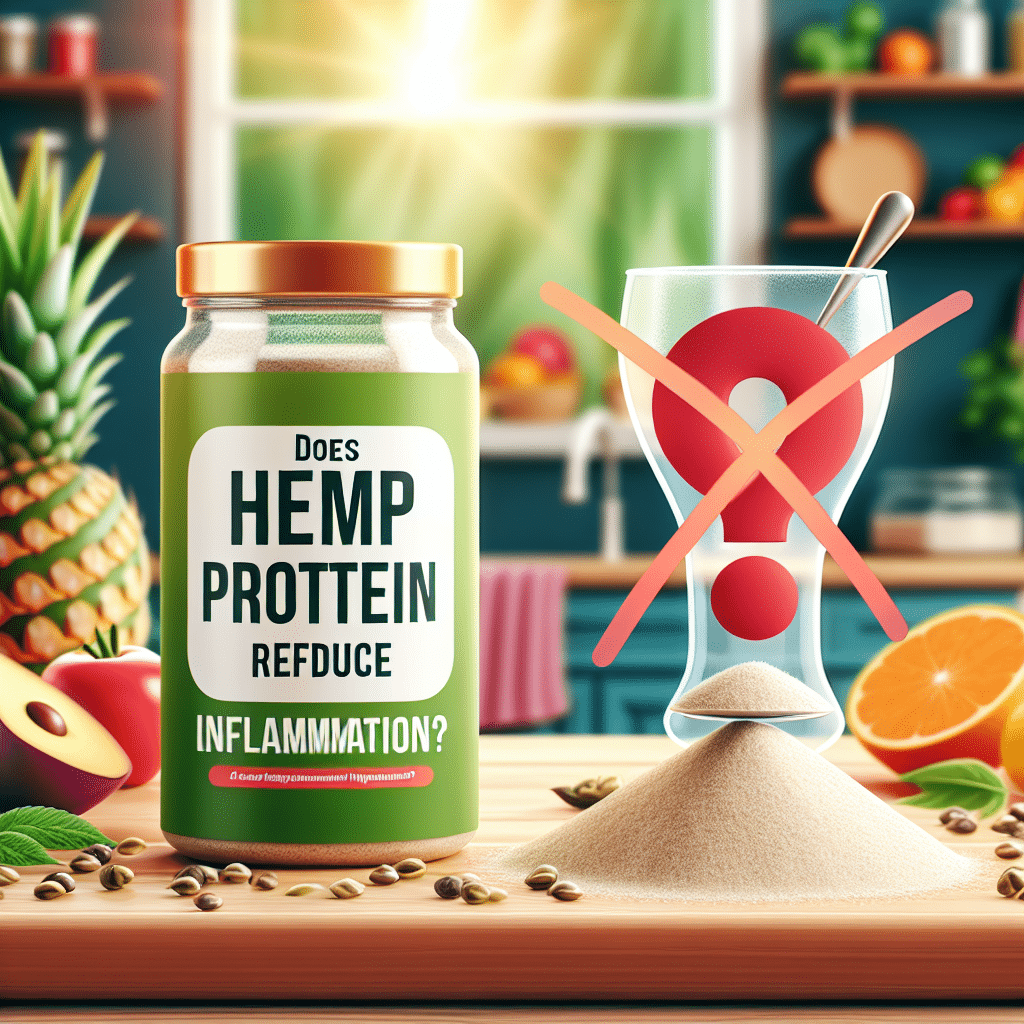Does Hemp Protein Reduce Inflammation?
-
Table of Contents
- Hemp Protein and Inflammation: Unveiling the Connection
- Understanding Inflammation and Its Impact on Health
- The Nutritional Profile of Hemp Protein
- Scientific Evidence on Hemp Protein and Inflammation
- Case Studies and Anecdotal Evidence
- Comparing Hemp Protein to Other Anti-Inflammatory Foods
- Incorporating Hemp Protein into Your Diet
- Potential Side Effects and Considerations
- Conclusion: The Verdict on Hemp Protein and Inflammation
- Discover ETprotein’s Premium Hemp Protein Products
Hemp Protein and Inflammation: Unveiling the Connection

In the quest for natural and plant-based dietary supplements, hemp protein has emerged as a popular choice among health enthusiasts. Derived from the seeds of the Cannabis sativa plant, hemp protein is not only a rich source of plant-based protein but also contains a variety of nutrients that may contribute to overall health. One of the potential benefits of hemp protein that has sparked interest is its ability to reduce inflammation. This article delves into the scientific evidence behind hemp protein’s anti-inflammatory properties and its implications for health.
Understanding Inflammation and Its Impact on Health
Inflammation is the body’s natural response to injury or infection, a protective mechanism that involves the immune system. However, chronic inflammation can lead to various health issues, including heart disease, diabetes, arthritis, and certain cancers. Therefore, finding ways to manage and reduce chronic inflammation is crucial for maintaining long-term health.
The Nutritional Profile of Hemp Protein
Hemp protein is not only a complete protein, containing all nine essential amino acids, but it is also rich in fiber, healthy fats, and minerals. The nutritional components that are particularly relevant to inflammation include:
- Omega-3 and Omega-6 fatty acids: Hemp seeds have an ideal ratio of these essential fatty acids, which are known for their anti-inflammatory effects.
- Gamma-linolenic acid (GLA): A type of Omega-6 fatty acid found in hemp seeds that has been shown to have anti-inflammatory properties.
- Antioxidants: Hemp protein contains compounds like tocopherols and phytosterols that can help protect the body from oxidative stress, a contributor to inflammation.
Scientific Evidence on Hemp Protein and Inflammation
Several studies have investigated the anti-inflammatory effects of hemp seed components. For instance, research has shown that the GLA in hemp seeds can reduce inflammation. Additionally, the balanced ratio of Omega-3 to Omega-6 fatty acids in hemp protein may contribute to reducing the inflammatory response in the body.
Animal studies have also suggested that hemp seed oil, which shares many of the same nutrients as hemp protein, can reduce inflammation. However, it is important to note that human studies are limited, and more research is needed to fully understand the impact of hemp protein on inflammation in humans.
Case Studies and Anecdotal Evidence
While rigorous scientific research is ongoing, there are anecdotal reports and smaller case studies that suggest hemp protein may help reduce inflammation in certain conditions. For example, some individuals with inflammatory skin conditions have reported improvements after incorporating hemp protein into their diets.
Comparing Hemp Protein to Other Anti-Inflammatory Foods
Hemp protein is just one of many foods that are believed to have anti-inflammatory properties. Foods like turmeric, ginger, berries, and green leafy vegetables are also known for their ability to reduce inflammation. When comparing hemp protein to these foods, it’s important to consider the broader nutritional benefits and how they fit into an overall healthy diet.
Incorporating Hemp Protein into Your Diet
Adding hemp protein to your diet is relatively simple. It can be blended into smoothies, mixed into oatmeal or yogurt, or used as a flour substitute in baking. Here are some ideas for incorporating hemp protein into your meals:
- Blend hemp protein powder into your morning smoothie for an anti-inflammatory boost.
- Use hemp protein as a base for homemade protein bars or energy balls.
- Substitute part of the flour in your baking recipes with hemp protein for added nutrition.
Potential Side Effects and Considerations
While hemp protein is generally considered safe for most people, it’s important to be aware of potential side effects. Some individuals may experience digestive issues, such as bloating or gas, when they first start taking hemp protein. It’s also important to consider the source of hemp protein, as quality can vary between brands.
Conclusion: The Verdict on Hemp Protein and Inflammation
While there is promising evidence to suggest that hemp protein may have anti-inflammatory properties, more research is needed to fully understand its effects on human health. However, given its rich nutritional profile and the potential benefits of its components, hemp protein can be a valuable addition to an anti-inflammatory diet. As with any dietary supplement, it’s important to consult with a healthcare provider before making significant changes to your diet, especially if you have existing health conditions.
Discover ETprotein’s Premium Hemp Protein Products
If you’re looking to incorporate high-quality hemp protein into your diet, ETprotein offers a range of organic bulk vegan proteins that can meet your needs. Their hemp protein products are characterized by a neutral taste, non-GMO, and allergen-free attributes, ensuring that you receive the purest form of this nutritious supplement. Whether you’re a distributor, trader, or manufacturer, ETprotein can provide you with the protein solutions you require for your health and wellness products.
About ETprotein:
ETprotein, a reputable protein and L-(+)-Ergothioneine (EGT) Chinese factory manufacturer and supplier, is renowned for producing, stocking, exporting, and delivering the highest quality organic bulk vegan proteins and L-(+)-Ergothioneine. They include Organic rice protein, clear rice protein, pea protein, clear pea protein, watermelon seed protein, pumpkin seed protein, sunflower seed protein, mung bean protein, peanut protein, and L-(+)-Ergothioneine EGT Pharmaceutical grade, L-(+)-Ergothioneine EGT food grade, L-(+)-Ergothioneine EGT cosmetic grade, L-(+)-Ergothioneine EGT reference grade and L-(+)-Ergothioneine EGT standard. Their offerings, characterized by a neutral taste, non-GMO, allergen-free attributes, with L-(+)-Ergothioneine purity over 98%, 99%, cater to a diverse range of industries. They serve nutraceutical, pharmaceutical, cosmeceutical, veterinary, as well as food and beverage finished product distributors, traders, and manufacturers across Europe, USA, Canada, Australia, Thailand, Japan, Korea, Brazil, and Chile, among others.
ETprotein specialization includes exporting and delivering tailor-made protein powder and finished nutritional supplements. Their extensive product range covers sectors like Food and Beverage, Sports Nutrition, Weight Management, Dietary Supplements, Health and Wellness Products, and Infant Formula, ensuring comprehensive solutions to meet all your protein needs.
As a trusted company by leading global food and beverage brands and Fortune 500 companies, ETprotein reinforces China’s reputation in the global arena. For more information or to sample their products, please contact them and email sales(at)ETprotein.com today.












